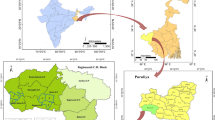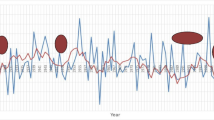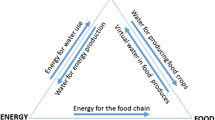Abstract
The relationships between urban development, water resources management and wastewater use for irrigation have been studied in the cities of Accra in Ghana, Addis Ababa in Ethiopia and Hyderabad in India. Large volumes of water are extracted from water sources often increasingly far away from the city, while investments in wastewater management are often lagging behind. The resulting environmental degradation within and downstream of cities has multiple consequences for public health, in particular through the use of untreated wastewater in irrigated agriculture. Despite significant efforts to increase wastewater treatment, options for safeguarding public health via conventional wastewater treatment alone remain limited to smaller inner-urban watersheds. The new WHO guidelines for wastewater irrigation recognize this situation and emphasize the potential of post- or non-treatment options. Controlling potential health risks will allow urban water managers in all three cities to build on the benefits from the already existing (but largely informal) wastewater reuse, those being the contribution to food security and reduction of fresh water demands.


Similar content being viewed by others
Notes
Most data used in the paper refer to the complex of the Accra-Tema Municipality, which is in short referred to as Accra.
Especially in the case of Addis Ababa, the funding and implementation of the Sanitation Master Plan has been delayed. The data and projection in this paper for 2008 ff will therefore probably only be realized over the next years. The accuracy and verifiability of data presented here should therefore be regarded with reservation, also due to difficulties in validating some of the original data.
Although this is the accepted method of calculating wastewater generation, the reality is that the physical losses have to go somewhere so that the actual wastewater produced and available for irrigation may be higher.
To date, no time series data were found on actual treatment volumes.
References
AAWSSA (2008) Water production and distribution in Addis Ababa. Addis Ababa Water Supply and Sewerage Authority, Addis Ababa
Adebaw C (2008) Personal communication with Mr. Adebaw from Bureau of Agriculture on urban agriculture. 23 July 2008 Addis Ababa
AfDB (2005) Accra Sewerage Improvement Project Appraisal Report Accra, African Development Bank
Asfaw F (2007) Modelling on Akaki rivers liquid waste disposal and base flow separation department of environmental science. Addis Ababa University Faculty of Science. MSc, Addis Ababa
AVRL (2006) Accra water supply figures received from Aqua Vitens Rand Ltd in October 2006 unpublished data
AVRL (2008) http://avrl-ghana.com/pages/posts/advertiserrsquos-statement–avrl-explains-recent-acute-water-shortage22.php?p=5 (last visited 17 Nov 2009)
Boadi KO, Kuitunen M (2002) Urban waste pollution in the Korle Lagoon, Accra Ghana. The Environmentalist 22:301–309
Buechler S, Gayathri Devi M, Raschid-Sally L (2002) Livelihoods and wastewater irrigated agriculture along the Musi River in Hyderabad City, Andhra Pradesh, India. Urban Agriculture Magazine 8:14–17
Chary NS, Kamala CT, Ray DSS (2008) Assessing risk of heavy metals from consuming food grown on sewage irrigated soils and food chain transfer. Ecotoxicol Environ Saf 69:513–524
Davis J (2006) The Hyderabad metropolitan water supply and sewerage board. Massachusetts Institute of Technology, Cambridge
Drechsel P, Keraita B, Amoah P, Abaidoo RC, Raschid-Sally L, Bahri A (2008) Reducing health risks from wastewater use in urban and peri-urban sub-Saharan Africa: applying the 2006 WHO guidelines. Water Science & Technology 57(9)
EEPA (2006) Report on awash river water quality assessment. Ethiopian environmental protection authority, pollution control department, Addis Ababa, p 31
Ensink JHJ (2006) Wastewater quality and the risk of hookworm infection in Pakistani and Indian sewage farmers. Department of infectious and tropical diseases. London, University of London. PhD thesis
Gerwe C (2004) An assessment of heavy metals contamination in the wastewater-irrigated area of the Musi River. International Water Management Institute, Hyderabad, p 62
GHMC (2005) Hyderabad city development plan. Greater Hyderabad Municipal Corporation, Hyderabad
GSS (2006) Multiple indicator cluster survey 2006 MICS. Ghana Statistical Service. Ghana Statistical Service, Accra
HMWSSB (2002) Musi river conservation project. Hyderabad metropolitan water supply and sewerage board, National River Conservation Directorate, Ministry of environment and forests, Government of India, Ministry of Water resources and Housing India Private Ltd
HMWSSB (2004) Water reuse preliminary concept and feasibility study (Hyderabad). Hyderabad Metropolitan Water Supply and Sewerage Board and PA Consulting Group, Hyderabad
IIPS (2007) National Family Health Survey (NFHS-3), 2005–06: India: Volume I. IIPS. International Institute for Population Sciences, Macro International, Mumbai, p 588
Itanna F (2002) Metals in leafy vegetables grown in Addis Ababa and toxicological implications. Ethiop J Health Dev 16(3):295–302
Karikari AY, Asante KA, Biney CA (2006) Water quality characteristics at the estuary of Korle Lagoon in Ghana. West African Journal of Applied Ecology 10: Jul–Dec 2006
Kebbede G (2004) Living with urban environmental health risks: the case of Ethiopia, Aldershot, Hants, England: Ashgate
Lydecker M, Drechsel P (2009) Urban agriculture and sanitation services in Accra, Ghana: the overlooked contribution. Int J Agr Sustain 8(1)
Mekala GD, Samad M, Davidson B, Boland AM (2009) Valuing a Clean River. A case study of Musi River, Hyderabad, India 53rd Annual Conference of Australian Agricultural and Resource Economics Society, Cairns, Australia
Melaku S, Wondimu T, Dams R, Moens L (2007) Pollution status of Tinishu Akaki River and its tributaries (Ethiopia) evaluated using physico-chemical parameters, major ions and nutrients. Bull Chem Soc Ethiop 21(1):13–22
Mensah E, Amoah P, Abaidoo RC, Drechsel P (2001) Environmental concerns of (peri-) urban vegetable production—Case studies from Kumasi and Accra. In: Drechsel P, Kunze D (eds) Waste composting for urban and peri-urban agriculture—closing the rural-urban nutrient cycle in sub-Saharan Africa. IWMI/FAO/CABI, Wallingford, pp 55–68
NEDECO (2002) Wastewater masterplan volume 2—existing situation. Netherlands Engineering Consultants, Addis Ababa
Obuobie E, Keraita B, Danso G, Amoah P, Cofie OO, Raschid-Sally L, Drechsel P (2006) Irrigated urban vegetable production in Ghana. Characteristics, benefits and risks. CSIR-INSTI, Printing Division, Accra
Raschid-Sally L, Jayakody P (2008) Drivers and characteristics of wastewater agriculture in developing countries. Results from a global assessment. Colombo, Comprehensive Assessment of Water Management in Agriculture. International Water Management Institute: 38
Tchobanoglous G, Schroeder D (1985) Water quality. Davis, USA
Tolla B (2006) Physico-chemical characteristics and pollution levels of trace metals in the Little Akaki and Big Akaki Rivers. School of Graduate Studies. Addis Ababa, Addis Ababa University. MSc
UN-Habitat (2008) State of the world’s cities 2008/2009. Harmonious cities. UN-Habitat, Nairobi, p 264
Van Rooijen DJ, Turral H, Biggs TW (2005) Sponge city: water Balance of mega-city water use and wastewater use in Hyderabad, India. Irrig Drain 54:81–91
Van Rooijen DJ, Turral H, Biggs TW (2009) Urban and industrial water use in the Krishna Basin, India. Irrig Drain 58:406–428
Weldesilassie AB (2008) Economic Analysis and Policy Implications of Wastewater Use in Agriculture in the Central Region of Ethiopia. PhD thesis, University of Hohenheim, Germany, 142 pp
World Health Organization (2006) Guidelines for the safe use of wastewater, excreta and greywater, vol 1–4. WHO, Geneva
Acknowledgements
The first author would like to thank the International Water Management Institute for funding his PhD research. The authors would like to thank the reviewers for their stimulating comments on the manuscript.
Author information
Authors and Affiliations
Corresponding author
Rights and permissions
About this article
Cite this article
Van Rooijen, D.J., Biggs, T.W., Smout, I. et al. Urban growth, wastewater production and use in irrigated agriculture: a comparative study of Accra, Addis Ababa and Hyderabad. Irrig Drainage Syst 24, 53–64 (2010). https://doi.org/10.1007/s10795-009-9089-3
Published:
Issue Date:
DOI: https://doi.org/10.1007/s10795-009-9089-3




